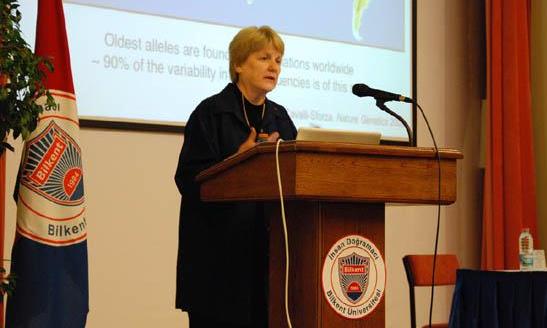Noted Human Geneticist Speaks at Bilkent on Gene Discovery in Complex Diseases
BY ALPER ÖZKAN (MSN/PhDII)
Last Wednesday, Bilkent University hosted a talk by Mary-Claire King, professor of genome sciences and of medicine at the University of Washington. A human geneticist, she is noted for discovering the vital breast cancer susceptibility genes BRCA1 and BRCA2, demonstrating the shared genetic heritage of humans and chimpanzees by comparative protein analysis and pioneering the use of genetic sequencing in the identification of murder victims and relatives of missing persons. Addressing Bilkent students as the academic grandchildren of Professor İhsan Doğramacı, Dr. King began by remarking on how great scholars like him are virtually immortal: even after death, their legacy lives on in their disciples, their intellectual children and grandchildren who continue to uphold their ideals and improve upon their great work.
While Dr. King's research career has encompassed many impressive highlights, her talk, entitled "Anna Karenina and the Multiple Origins of Complex Disease," focused on her current efforts to advance the field of personalized medicine by identifying individually rare mutations that together comprise surprisingly common diseases. Rejecting the long-standing notion that complex diseases result from the additive effects of minor but numerous flaws in the genetic code, Dr. King underlined the substantial body of evidence indicating that many common diseases are in fact vast series of rare single-gene defects with similar symptoms, where each individual patient suffers from a separate, and often unique, mutation that arises independently of any other incidence of the disease and may be located on any of several vital genes. These key defects regularly appear in the genetic pool and are eliminated within several generations by natural selection, implicating recent mutations as the prime culprit behind such diseases as schizophrenia and a number of cancers. A natural conclusion, she said -- referencing the "Anna Karenina principle" based on novelist Leo Tolstoy's famed dictum that every unhappy family is unhappy in its own way -- is that separate occurrences of a particular disease are frequently caused by completely different mutations on completely different genes and as such require different treatments. In order to combat such an insidious foe, Dr. King combines her formidable expertise in cancer biology with next-generation sequencing and cutting-edge bioinformatics tools, selecting a crucial set of genes relevant to a particular disease and identifying the alterations of each gene in both patients and healthy individuals. With the use of an extremely thorough method that scans every nucleotide hundreds of times on average ("deep sequencing") and leaves virtually no room for errors, the exact genetic cause of the disease may be pinpointed to a single gene for each patient, which will ideally form a basis for personalized treatment options. Even after ignoring mutations with potentially detrimental effects and focusing only on those known with certainty to disrupt gene function, Dr. King's research group has already demonstrated the effectiveness of this approach on three different platforms -- BROCA for breast and ovarian cancer, ColoSeq for Lynch and adenomatous polyposis syndromes and OncoPlex for a wide array of cancer genes.
In addition to cancer research, Dr. King's team also works to identify gene function with regard to schizophrenia, a devastating mental disorder that affects over 24 million people worldwide. By scanning the variance in copy number alterations in schizophrenic and related non-schizophrenic individuals, Dr. King's team has identified a number of genetic pathways implicated as being altered in schizophrenia, extending the current corpus of knowledge on this highly complex disorder and driving future research efforts to develop treatments that focus precisely on those particular regulatory networks.
In both cases, such comprehensive insight into the mutational basis of disease incidence has the potential to allow (and, in some cases, already allows) physicians to personalize each individual patient's treatment, maximizing the effects of drugs and avoiding ineffective approaches.
Dr. King's presentation provided an authoritative perspective on this highly important and fascinating field of work for the large number of Bilkent students, faculty members and others in attendance.
